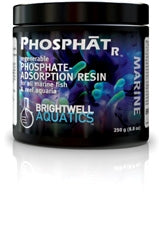Description
Brightwell PhosphatR
Overview
- Next-generation regenerable phosphate adsorption resin effective in marine aquaria; will also remove silicates.
- Far more effective than activated alumina and granular ferric products.
- Will not negatively impact water quality nor release phosphate or silicate once exhausted; will not break up or disintegrate like ferric medias, and contains no aluminum to dissolve in aquaria and harm inhabitants.
- Synthetic polymer resin beads provide for durability and excellent flow characteristics; may be employed in fluiduzed-bed, canister, or passive filtration.
- Regenerable up to five times, dramatically increasing cost effectiveness.
Instructions and Guidelines
Basic : Prior to first use, rinse resin under a stream of purified water. For initial application on aquarium, use 1 ml of PhosphatR per 1 US-gallon of water in system and monitor phosphate concentration during usage. Subsequent application of resin may be at the rate of 2 ml per 1 US-gallon.
Advanced: Prior to first use, rinse resin under a stream of purified water. To a point, effectiveness of resin is directly related to the reaction time it has with aquarium water; the longer the reaction time, the more effectively it will remove phosphate and silicate. Once phosphate concentration (”[PO43-]”) has not changed for a period of 4 - 6 hours, remove and regenerate resin, then reapply if necessary. In all cases, the use of a mechanical pre-filter to remove particulate organic material from water prior to its interaction with this media will prolong effectiveness. Fluidized-bed filtration (recommended): follow instructions of filter manufacturer for optimal volume of media to use in reaction chamber; start at a low flow rate and adjust to keep media in a steady “boil” within lower 2/3 of chamber; flow rate should not be such that resin is ejected into aquarium. Canister filtration: Load resin into filter cartridge as directed by filter manufacturer; leave resin in place until [PO43-] reaches desired level or remains unchanged, as directed above. Slowing the flow of water through the filter may be required to obtain maximum effectiveness of resin. Passive filtration: Place resin loosely in a 150µm mesh filter bag and locate in an area of low- to medium-flow. Turning bag over once during usage will serve to shift the resin beads and increases effectivness of this method.
Note: Resin sold moist. Keep closed to prevent drying. Weight varies due to moisture content, therefore product is sold by volume rather than weight.

